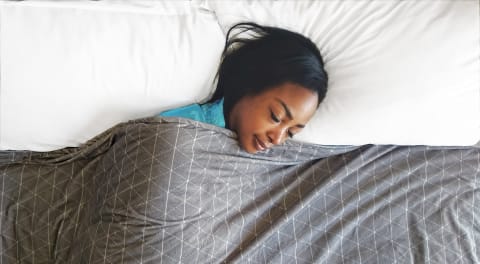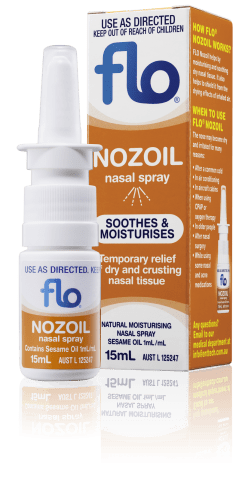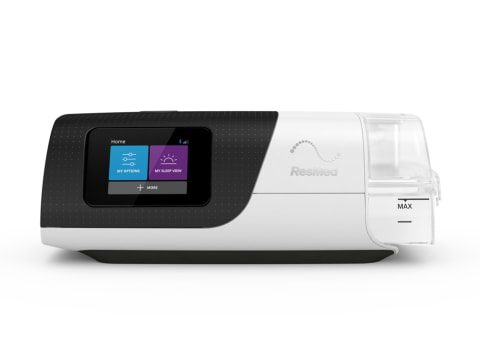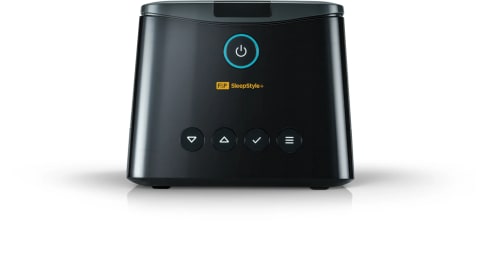Does CPAP Stop Snoring
Does CPAP Stop Snoring? A Clear Path to Quieter, Healthier Sleep
Snoring might seem harmless, even humorous, but it can signal serious health issues and disrupt sleep for both the person snoring and anyone nearby. If you’ve been diagnosed with Obstructive Sleep Apnea (OSA), or if loud snoring is affecting your relationships or wellbeing, it’s natural to wonder: can CPAP stop snoring?
CPAP Reduces Snoring in Sleep Apnea Patients
Continuous Positive Airway Pressure (CPAP) therapy is widely regarded as the most effective treatment for snoring caused by Obstructive Sleep Apnea (OSA). OSA occurs when the airway becomes partially or fully blocked during sleep, often due to relaxed throat muscles or excess tissue in the upper airway. These blockages not only cause apneas but also lead to the turbulent airflow responsible for snoring.
CPAP therapy works by delivering a continuous stream of pressurised air through a CPAP mask, which keeps the airway open and prevents the collapse that leads to both apnea events and snoring. Devices like the ResMed AirSense 10 AutoSet and the newer ResMed AirSense 11 automatically adjust pressure based on your breathing patterns, ensuring optimal support throughout the night.
When the airway remains open, snoring significantly reduces or ceases altogether. For many people, this happens from the very first night of CPAP use. It’s not uncommon for bed partners to comment on the sudden silence and express their relief. In fact, reduced snoring is often the first tangible benefit that users and their families notice.
Snoring associated with OSA tends to be loud and gasping, often followed by pauses in breathing. These episodes disturb the sleeper’s rest and affect their partner’s sleep too. By treating the cause of these disruptions, CPAP eliminates the inconsistent breathing pattern that generates loud vibrations in the throat. It creates a stable breathing environment that supports restful sleep.
It’s important to understand that CPAP is not a general snoring cure for everyone. It is most effective when snoring is a symptom of OSA. If your snoring is caused by nasal allergies, alcohol consumption, or sleeping position alone, CPAP may not be the right solution. That’s why proper diagnosis through sleep study is crucial. At Sove, we guide you through this process, from the initial consultation to diagnosis and treatment setup, ensuring that your snoring relief is grounded in accurate clinical insights.
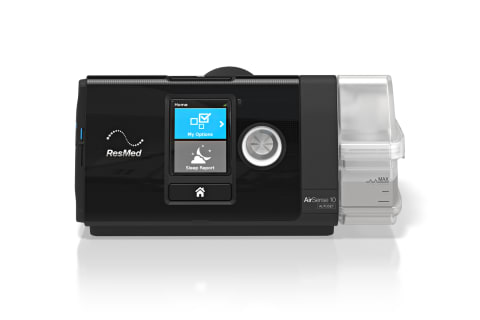 Further $50 Off with code "VALENTINES50"
ResMed AirSense 10 AutoSet 4G CPAP Machine
Further $50 Off with code "VALENTINES50"
ResMed AirSense 10 AutoSet 4G CPAP Machine
Immediate and Sustained Snoring Reduction
One of the most rewarding aspects of CPAP therapy is the speed at which many users experience relief. For many patients, snoring decreases significantly—or stops altogether—within the first few nights of consistent use. However, long-term success relies on several factors:
- Consistency is key. CPAP therapy is not a one-off treatment; it works best when used nightly, for the full duration of sleep. Skipping nights or only using CPAP for part of the night can undermine the benefits.
- A successful CPAP experience also depends on comfort. If your mask is uncomfortable or doesn’t seal well, air leaks can occur, reducing therapy effectiveness and sometimes even creating whistling noises that disturb sleep.
- Sustained results also come from proactive monitoring. Modern CPAP machines come equipped with data tracking capabilities. Apps like myAir from ResMed allow users to see nightly scores on mask fit and therapy hours.
Remember, it’s normal to take time to adjust to sleeping with a mask. Some users may feel claustrophobic at first or worry about how they look. With gentle guidance, education, and peer support, most people find they can integrate CPAP into their nightly routine successfully, reaping the long-term rewards of better rest and reduced snoring.
Sleep Quality for Users and Their Partners
Snoring is often a shared issue. While the person snoring may be unaware of their nighttime noise, their partner is usually well aware. Loud, chronic snoring leads many couples to sleep in separate rooms, experience increased tension, or suffer from disrupted sleep that impacts daily mood and performance. By stopping the snoring at its root, CPAP helps restore harmony and restful nights for both parties.
Numerous studies have shown that bed partners of CPAP users report improved sleep satisfaction, fewer awakenings, and a stronger emotional connection with their partner. Being able to sleep in the same bed again and enjoy uninterrupted rest is a powerful relationship booster.
Increased energy and improved mood are also major benefits. When you stop snoring and start breathing normally at night, your sleep becomes more restorative. You wake up feeling refreshed, rather than groggy or irritable. This change can lead to improvements in job performance, parenting, exercise habits, and general outlook on life.
Beyond the bedroom, the ripple effects of better sleep extend to every area of life. Whether it’s feeling more focused at work, being more patient with loved ones, or having the energy to enjoy hobbies again, the benefits of CPAP touch every corner of your day.=
Other Health Benefits
Snoring may be the most audible symptom of sleep apnea, but it’s far from the most dangerous. Left untreated, OSA contributes to a host of health issues that affect everything from heart health to mental wellbeing. Thankfully, CPAP therapy addresses these systemic concerns by improving oxygen flow and stabilising sleep architecture.
One of the most significant health benefits of CPAP is its effect on cardiovascular health. Repeated drops in oxygen levels during apnea episodes put enormous strain on the heart. Over time, this can lead to high blood pressure, irregular heart rhythms, and increased risk of heart attack or stroke. By eliminating these events, CPAP helps protect your heart and may even reduce medication needs.
Sleep deprivation from untreated OSA can impair glucose metabolism and increase insulin resistance—two major factors in the development of type 2 diabetes. Regular CPAP use improves sleep depth and duration, both of which are essential for balanced hormone regulation.
Mental health also gets a boost from effective CPAP therapy. Poor sleep is closely linked to anxiety, depression, and cognitive decline. Users often report clearer thinking, improved memory, and better emotional resilience after just a few weeks of therapy.
Improved immune function is another benefit. Sleep is crucial for immune regulation, and fragmented rest caused by snoring and apnea weakens your body’s ability to fight off infections. In fact, amiCPAP users are often sick less frequently and recover more quickly.
ALWAYS FOLLOW THE DIRECTIONS FOR USE. CPAP is used for Obstructive Sleep Apnoea treatment. When considering whether a sleep study or CPAP is right for you, speak to your doctor. Medicare criteria and T&Cs apply.
Frequently Asked Questions (FAQ)
What causes snoring, and how does CPAP address these causes?
Snoring is usually caused by turbulent airflow due to a narrowed or obstructed airway. In sleep apnoea, the airway partially collapses, which not only causes loud snoring but also disrupts breathing. CPAP prevents this by gently pressurising the airway, holding it open throughout the night. This eliminates the vibrations that cause snoring and ensures smooth breathing. The result is quieter sleep and fewer interruptions for both the user and their partner.
How do I get evaluated to see if CPAP is right for my snoring?
Start by speaking with your GP or contacting a clinic like Sove CPAP Clinic. We offer both in-lab and home-based sleep studies to diagnose Obstructive Sleep Apnoea and assess your snoring. Once your sleep study results are reviewed by a sleep or respiratory specialist, we help you explore CPAP options that fit your lifestyle, sleep habits, and comfort preferences.
Does alcohol or smoking affect CPAP effectiveness?
Yes. Alcohol relaxes throat muscles, which can increase airway collapse and make snoring worse—even while using CPAP. Smoking causes inflammation and congestion in the airways, which can reduce airflow and make mask comfort more difficult. While CPAP still provides benefit, reducing or avoiding these habits will enhance therapy effectiveness and overall respiratory health.
How do I know if my CPAP pressure setting is correct to stop snoring?
Correct pressure is essential. If your pressure is too low, it may not fully prevent airway collapse and snoring could persist. If it’s too high, it can cause discomfort or air leaks. Auto-adjusting machines like the ResMed AirSense 11 can self-regulate, but regular follow-ups with your clinician are crucial. At Sove, we review your therapy data to fine-tune pressure settings and ensure optimal outcomes.
How many hours per night should CPAP be used?
Ideally, CPAP should be used for the entire duration of sleep—typically 7 to 9 hours per night. Using it only part of the night reduces its effectiveness, especially since OSA tends to worsen during deeper sleep and REM stages. Consistent nightly use is key to reducing snoring, improving health, and feeling more rested.
What if I still snore while using CPAP?
Occasional snoring may occur, especially during periods of nasal congestion or poor mask fit. Persistent snoring while on CPAP could indicate an incorrect pressure setting or mask leak. It’s important to consult with your sleep clinician or visit Sove for a therapy review. Adjusting your mask, reviewing data, or upgrading to a more advanced device may resolve the issue and restore quiet sleep




